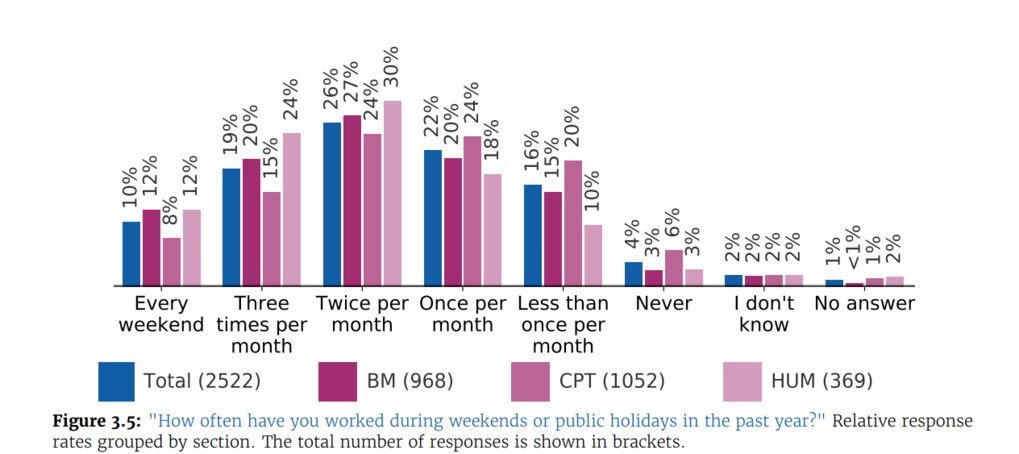Mental Health Awareness Week 2019
by Madeleine Bleasdale

Over the last few years, the conversation about mental health in the workplace has gained momentum. More employers are taking action to support their staff and promote a healthy work environment, including the implementation of mental health first aid training, banning out-of-hours emails and trialing a 4-day working week. There has been growing recognition that mental illness is a global public health problem requiring significant investments in research to improve treatments and the establishment of support systems. Despite these developments, there is still a long way to go to ensure that organisations are able to support and protect the mental health of their employees.
The mental health of researchers and academics has come under increased scrutiny with a number of studies beginning to expose the true extent of this potential epidemic. In 2018, a survey of over 2,000 graduate students showed that they were six times more likely to suffer from depression and anxiety in comparison to the general population. In May 2019, the first International Conference on the Mental Health & Wellbeing of Postgraduate Researchers took place in the UK. The conference sold out at a record speed, demonstrating a real desire to learn more about mental health and to generate solutions to combat the shortfall in support for students, postgraduates and researchers affected by mental illness.
Raising awareness about mental health in academia has been an important long-term objective of PhDnet. Over the past few years Offspring have featured articles about the history of depression and Max Planck mental health initiatives, such as a workshop that identified stressful and negative aspects of the MPG doctoral experience and generated potential solutions to combat them.

This year, PhDnet launched Mental Health Awareness Week (MHAW) (7-11th October) encouraging employees of the Max Planck Society to start thinking, talking and engaging with one another about mental health. By raising awareness, we hope to reduce the stigma around mental illness, enabling people to speak openly without fear of judgement, and in doing so, help in creating a healthier work environment.
Mental illness can affect anyone at any level but here we will focus mainly on the challenges that doctoral researchers are facing and tackle two key questions: Why is poor mental health an inherent issue in academia? And: Wwhat can we do about it?
The culture of busyness
Many of us have answered the question, “How are things going?” with “I’m so busy!” This almost automatic response seems to be the accepted way of demonstrating a hard-working and diligent lifestyle. In our fast-paced modern world, many people glorify overworking, wearing busyness like a badge of honour. Rather than associating increased leisure time with success, there is evidence that a busy, overworked lifestyle has now become an important status symbol. If you are busy, you must be important. For most doctoral researchers there are times when an impending deadline forces them to work overtime but continually celebrating overworking is harmful. If someone says, “I’ve worked 60 hours this week”, we should feel concerned rather than impressed.
Publish or perish
It is no secret that researchers are judged largely based on their publications. For those doing a PhD by publication, the entire qualification rests on getting articles accepted and published. But the pressure persists at all rungs of the career ladder with universities and funding bodies ranking candidates on the quantity and quality of their scientific articles. The pressure to publish cannot only lead to bad practices such as “salami slicing” or multiplication of authorship but can have a detrimental impact on the researcher’s mental health. In particular as a doctoral researcher, the publication progress is largely influenced by external processes such as journals’ administrative processes, reviewers’ feedback and co-authors’ corrections. The often difficult and drawn-out process of getting a paper to publication can leave researchers feeling frustrated, disappointed and demoralised.
Work-life balance
The flexibility of working times within academia has its advantages, but it also means work can easily spill over into evenings and weekends. “I’ll take a look at it this evening” is an all too common phrase. Although many doctoral researchers have employment contracts, the 2018 PhDnet Survey showed that many are working more than they are being paid, averaging an additional 11.2 hours per week. And only 4% of participants stated they had never worked on a weekend or holiday during the past year. This year, the PhDnet Steering Group successfully secured an extra 10 days of annual leave for all PhDs. But will doctoral researchers take these extra days? And if they do, will they still feel obliged to work during their vacation?

Job insecurity and relocation
The job market for academics is tough and it has been estimated that less than 20% of postdocs will ultimately secure a tenure-track or permanent research position. The lack of job security can put huge strain on individuals and be a major source of anxiety and stress. Those willing to chase the available jobs must reside themselves to the prospect of relocating every few years and this is particularly hard for those with partners and families.
A way forward
There is no single solution for creating a healthy work culture or environment, especially when some issues stem from deeply ingrained attitudes and will require significant structural changes of funding bodies and academic institutions. But changes can be made at every level to raise awareness of mental health and, in turn, support those with a mental illness.
1. Breaking down barriers
The first and most important step is to decrease the stigma around mental illness. Many people living with a mental illness are reluctant to tell their employer, fearing judgement from peers and harmful effects on their career prospects. Nobody would hesitate to call in sick if they had the flu but there still remains a stigma around mental illness. Even at the most local-level, actions can be taken, such as checking in with a colleague who might not appear to be doing so well. It does not take long to send a message or make a phone call. And if you feel comfortable, sharing your own experiences about mental health can foster a more open and supportive environment.
At an institute level, it is important to increase access to information about local mental health services and occupational medicine (Betriebsarzt). For new employees, it can be particularly daunting to navigate a new health care system. All MPS employees are now able to access the "Employee and Manager Assistance Program" (EMAP). This is a free, anonymous on-the-spot counselling service offered by the Fürstenberg Institute. The helpline operates 24/7 and professional advice is given in German, English and other languages as required. The MHAW committee have also compiled a guide about how to navigate the German health system with a list of local counselling services.
2. Defining expectations and increased training for PIs
Turning to the doctoral experience itself, it is important that expectations between doctoral researchers and supervisors are defined as early as possible. This includes outlining work hours and setting milestones throughout the PhD. It is essential that those in a supervisory role are trained on how to provide mentorship, supervision and can identify when someone needs help. In many workplaces first aid courses are mandatory so why not extend this to mental health too?
3. Conflict management
In recent years, instances of harassment and bullying in academia have been widely publicised in the media. PhDnet have published an article, Power Abuse and Conflict Resolution, detailing their views and proposed changes. For doctoral researchers, preventative measures such as a TAC (Thesis Advisory Committee) and mandatory leadership training for PIs have been called for but further steps are needed to protect the wellbeing of researchers affected by conflict.
4. Beyond the office
For many people their work forms a core component of their identity and it is no different for those pursuing a doctoral degree. Scientific research can be highly demanding, requiring huge personal investment, and as a consequence many people's self-esteem is highly dependent on how well their research is progressing. It is therefore important to create boundaries and cultivate interests outside of work. Leisure activities and hobbies are important ways of connecting with others and relieving stress. Although counterintuitive taking a break from research and dedicating time to non-academic activities can ultimately lead to increased productivity at work.
Change will not happen overnight but everyone can do something to break the stigma around mental illness - be it reaching out to a colleague, compiling information about local health services or campaigning for change at the highest levels. We hope that as many people as possible participate in the Mental Health Awareness Week and use it as a stepping stone towards fostering a more supportive and inclusive work environment. For more information and resources please visit the MHAW website.

















